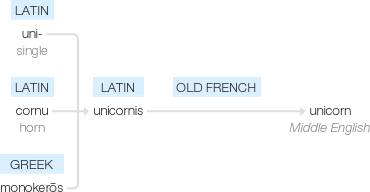Unicorn
Middle English: via Old French from Latin unicornis, from uni- ‘single’ + cornu ‘horn’, translating Greek monokerōs .
wiktionary
From Middle English unicorne, unikorn, from Anglo-Norman unicorne, Old French unicorne, and their source, Latin ūnicornis, from ūnus(“one”) + cornū(“horn”). Other senses from either rarity (e.g., possessing multiple skills) or by physical resemblance to having a horn (e.g., howitzer). The finance sense was coined by American investor Aileen Lee and first used in a 2013 article. [1]
etymonline
unicorn (n.)
early 13c., from Old French unicorne, from Late Latin unicornus (Vulgate), from noun use of Latin unicornis (adj.) "having one horn," from uni- "one" (from PIE root *oi-no- "one, unique") + cornus "horn" (from PIE root *ker- (1) "horn; head").
The Late Latin word translates Greek monoceros, itself rendering Hebrew re'em (Deuteronomy xxxiii.17 and elsewhere), which probably was a kind of wild ox. According to Pliny, a creature with a horse's body, deer's head, elephant's feet, lion's tail, and one black horn two cubits long projecting from its forehead. Compare German Einhorn, Welsh ungorn, Breton uncorn, Old Church Slavonic ino-rogu. Old English used anhorn as a loan-translation of Latin unicornis.
